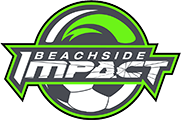Health and Safety
Our player's safety is our number one concern at Brevard Beachside Impact. All our coaches, assistant coaches, and managers are required to take annual training to help keep your player safe on and off the field.
Our club policy states that if lightning is detected 10 miles away from the field; we will clear the fields for 30 minutes. We strongly recommend players retreat to their guardian's car for safety during lightning. Please be aware of the weather during practices, as they will be cut short or cancelled due to inclement weather. We strongly recommend you follow our social pages and homepage for field closure messages.
If your child has suffered a head injury, there are a few telltale signs that may indicate a concussion.
https://www.fysa.com/concussion-awareness/
- Parent Guide to concussion safety
- BBSC Club Concussion Protocol
- Return to Play - Form for Player's Doctor
Who We Play For is an organization that supports Brevard Country in its mission to eliminate preventable sudden cardiac death in the young through affordable heart screenings. The screens are fast, easy and affordable - and can save your player's life. Learn more about Who We Play For here.
 HYDRATION & HEAT ILLNESSES AWARENESS
HYDRATION & HEAT ILLNESSES AWARENESS
by Dr. Tara Forcier, M.D.
BBSC Health & Safety Advisor
Welcome to another season of soccer, one of the best sports for fun and fitness! We are lucky that Florida’s climate permits children to play many sports year-round, but our hot weather poses challenges such as dehydration and overheating.
Symptoms of heat exhaustion include heavy sweating, dizziness, fatigue, feeling faint, weak rapid pulse, muscle cramps, nausea, headache, and a pale or flushed complexion. If left untreated, heat exhaustion may lead to heat stroke, a potentially life-threatening condition. The best approach is prevention by:
- Avoiding sunburn which interferes with your body’s ability to release heat.
- Wearing loose, light color and light weight clothing.
- Seeking cooler places during the hottest parts of the day. Have someone on your child’s team bring a shade tent to any practices or games that take place during the hottest parts of the day so that the team may rest in the shade for a few minutes on water breaks.
- Drinking a lot of fluids. Before a game or practice, have your child “tank up” by drinking an extra glass or bottle of water before going outside, and then taking frequent breaks to drink while playing. Before a tournament, it would be best to begin the hydration process the day before. Don’t wait for thirst to set in. Insist your child drink extra water throughout the day. Ideally, a child who is well hydrated will have urine that is pale yellow in color.
A couple of tips for bringing down core body temperature during a practice or game include offering popsicles at breaks or half time and encouraging the children to soak their hands in a cooler of ice water.
Remember that sports injuries also increase when fatigue sets in. Hydration and good nutrition will help delay the onset of fatigue. Hydration and appropriate breaks for rest, as well as the use of a tent, will ameliorate the affects of heat and sun exposure. Water is the best fluid source for most kids playing sports. However, if the kids are involved in extended play (such as at a tournament or camp), a sports drink that includes electrolytes and sugar (a quick energy source) may be a helpful addition.



